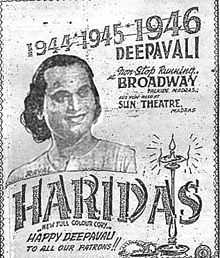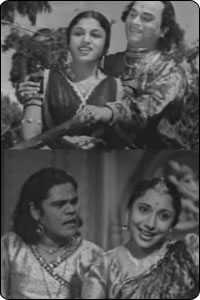Haridas (1944 film)
| Haridas | |
|---|---|
 Promotional poster of the film with a picture of M. K. Thyagaraja Bhagavathar displayed prominently, highlighting the film's successful three-year run at Broadway theater (1944, 1945 and 1946). | |
| Directed by | Sundar Rao Nadkarni |
| Produced by | Royal Talkies |
| Written by | Ilangovan |
| Starring |
M. K. Thyagaraja Bhagavathar T. R. Rajakumari N. C. Vasanthakokilam N. S. Krishnan T. A. Madhuram Pandari Bai S. R. Krishna Iyengar |
| Music by |
Papanasam Sivan G. Ramanathan |
| Cinematography |
Adi Irani T. Muthuswamy |
| Edited by | Sundar Rao Nadkarni |
Release dates | 16 October 1944 |
Running time | 117 minutes |
| Country | India |
| Language | Tamil |
| Box office |
|
Haridas (Tamil: ஹரிதாஸ்) is a 1944 Tamil language film directed by Sundar Rao Nadkarni and starring M. K. Thyagaraja Bhagavathar, T. R. Rajakumari and N. C. Vasanthakokilam. It holds the record of being the first film to run continuously for 110 weeks at a single theatre.[1][2][3][4][5][6]IBN Live included Haridas in its list of 100 greatest Indian films of all time.[7]
Production
Haridas was directed by Sundar Rao Nadkarni, a Marathi film director and produced by Royal Talkies. The film was adapted from the book "Sri Krishna Vijayam" by Elangovan.[1] It was based on the story of the life of a poet-saint called Haridas.[1][6] The role of Haridas was played by M. K. Thyagaraja Bhagavathar, who was highest paid actor in Tamil film industry then.[8] The film was very short (10,994 Feet[9]) compared to other films from the same period.[10] Featuring a number of melodious songs sung by Bhagavathar, the film was released on Deepavali Day (16 October) 1944.[11] Classical musician N. C. Vasanthakokilam, who was often compared to M. S. Subbulakshmi as a singer, played the role of Haridas' wife.[11][10] The film also marked the debut of renowned Tamil actress Pandari Bai.[10][12] The comedic duo of N. S. Krishnan and T. A. Mathuram were also cast in this film.[2]
Plot synopsis
Haridas (Thyagaraja Bhagavathar) is a vain individual who spends his life in luxury and lust ignoring his wife(Vasanthakokilam). But when his wealth is appropriated by a courtesan (T. R. Rajakumari), he realizes life's realities, reforms and spends the rest of his days serving his parents and God.
Cast and crew

- M. K. Thyagaraja Bhagavathar - Haridas
- T. R. Rajakumari - Haridas' mistress
- N. C. Vasanthakokilam - Haridas' wife
- N. S. Krishnan
- T. A. Mathuram
- P. B. Rangachari
- Harini
- Radhabai
- Pandari Bai
- S.R.Krishna Iyengar
- Sundar Rao Nadkarni - Editor and Director
- Ilankovan - Dialogue
- G. Ramanathan - Music
- Papanasam Sivan - Lyrics
- Adi Irani - Cinematographer
- T. Muthuswamy - Cinematographer
- H. Shantaram - Art Director
Soundtrack
All songs in this film became hits. The song "Manmadha leelayai vendrar undo" celebrating erotic love has become an enduring hit and the phrase has entered every day Tamil usage. Papanasam Sivan was the composer for this film and G. Ramanathan was in charge of the orchestration. A partial list of songs from this film:

- Manmadha Leelayai Vendrar Undo
- "Krishnaa mukunda muraree"
- "Annaiyum thandhaiyum"
- "Vaazhvil oru thirunaal"
- "Nijamma idhu nijamma"
- "Kadhiravan vudhayam kanden"
- "Ullam kavarum en paavaai"
- "Natanam innum aadanam"
- "Ennalum Indha"
- "Thottadharkellam"
- "Enadhuyir nadhar"
- "Ennudal thanil"
- "Kanna vaa manivanna vaa"
Reception
Haridas hit the theatres on Deepavali day (16 October) 1944. It was a huge success and ran for 110 consecutive weeks till Deepavali day (22 November) 1946 at the Sun Theatres in Broadway, Madras.[10][6] Including different theatres it had an uninterrupted theatrical run of 133 weeks.[13] With the profits earned from the film, the producers established a knitting company in Madurai.[6] Bhagavathar became Tamil cinema industry's highest paid star and was offered a salary of ![]() 1 lakh per film.[10][6] Following the success of Haridas, Bhagavathar was immediately booked for as many as twelve films.[6] However, he was not able to enjoy his success as he was arrested in November 1944 as a suspect in the Lakshmikanthan Murder Case.[10][2] IBN Live included the film in its list of 100 greatest Indian films of all time.[7]
1 lakh per film.[10][6] Following the success of Haridas, Bhagavathar was immediately booked for as many as twelve films.[6] However, he was not able to enjoy his success as he was arrested in November 1944 as a suspect in the Lakshmikanthan Murder Case.[10][2] IBN Live included the film in its list of 100 greatest Indian films of all time.[7]
See also
Lakshmikanthan Murder Case
References
- ↑ 1.0 1.1 1.2 Dhananjayan 2014, p. 56.
- ↑ 2.0 2.1 2.2 Blast From the Past - Haridas 1944, The Hindu 11 July 2008
- ↑ Yves Thoraval 2011, p. 38.
- ↑ S. Theodore Baskaran 1996, p. 46.
- ↑ Film News Anandan & year 2004, p. 33.2.
- ↑ 6.0 6.1 6.2 6.3 6.4 6.5 "Filmography of M. K. Thyagaraja Bhagavathar Page 1". Retrieved 2008-05-17.
- ↑ 7.0 7.1 "100 Years of Indian Cinema: The 100 greatest Indian films of all time". IBN Live. Retrieved 6 May 2013.
- ↑ Rajadhyaksha, Ashish; Willemen, Paul (1994). Encyclopaedia of Indian cinema. British Film Institute. p. 57. ISBN 0-85170-455-7. ISBN 978-0-85170-455-5.
- ↑ Film News Anandan 2004, p. 28.35.
- ↑ 10.0 10.1 10.2 10.3 10.4 10.5 Dhananjayan 2014, p. 57.
- ↑ 11.0 11.1 Randor Guy. "From Silents to Sivaji Ganesan - A Lookback". Archived from the original on 2008-05-23. Retrieved 2008-05-17.
- ↑ Guy, Randor (14 February 2003). "Actress who glowed with inner beauty". The Hindu. Retrieved 2008-05-17.
- ↑ 2011, p. 38.
External links
| Wikimedia Commons has media related to Haridas (1944 film). |
- Haridas at the Internet Movie Database
- "Video of the 'Manmathan Leelayil Vendrar Undo' song from Haridas". (In Public domain in India)
- "Video of 'Krishna Mukunda Murare' song from Haridas". (In public domain in India)
- "Video of 'Annaiyum Thanthaiyum Thaane' song from Haridas". (In public domain in India)
- "Video of 'Ennudal Thanil' song from Haridas". (In public domain in India)
Bibliography
- Thoraval, Yves (2000). The cinemas of India. India: Macmillan. p. 38. ISBN 0-333-93410-5. ISBN 978-0-333-93410-4.
- Baskaran, S. Theodore (1996). The eye of the serpent: an introduction to Tamil cinema. Chennai: East West Books. p. 46.
- Limca book of records. Bisleri Beverages Ltd. 1996.
- Film News Anandan (2004). Sadhanaigal padaitha Tamil Thiraipada Varalaaru (in Tamil). Chennai: Sivagami Publications. pp. 28.35, 33:2.
- Dhananjayan, G. (2014). Pride of Tamil Cinema: 1931 to 2013. Blue Ocean Publishers.
- Rajadhyaksha, Ashish; Willemen, Paul (1994). Encyclopaedia of Indian cinema. British Film Institute. p. 57. ISBN 0-85170-455-7. ISBN 978-0-85170-455-5.